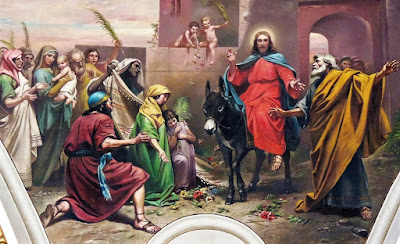MAKING AN ENTRANCE WITH CHRIST AND HIS PROMISE
Mark 11:1-11
Palm Sunday/Sunday of the Passion, Year B
Analysis by Michael Hoy
Author’s note: The selected text for this study is from the processional gospel for Palm Sunday. This gospel is deeply woven in the passion predictions and the passion narrative, to which references will be made. Mark’s gospel in particular is deeply emphatic about the cross of Christ that crosses our lives not only with God’s seeing through us, but with God’s promise in Christ seeing us through.
1When they were approaching Jerusalem, at Bethphage and Bethany, near the Mount of Olives, he sent two of his disciples. 2and said to them, “Go into the village ahead of you, and immediately as you enter it, you will find tied there a colt that has never been ridden; untie it and bring it. 3If anyone says to you, ‘Why are you doing this?’ just say this, ‘The Lord needs it and will send it back here immediately.’” 4They went away and found a colt tied near a door, outside in the street. As they were untying it, 5ome of the bystanders said to them, “What are you doing, untying the colt?” 6They told them what Jesus had said; and they allowed them to take it. 7Then they brought the colt to Jesus and threw their cloaks on it; and he sat on it. 8Many people spread their cloaks on the road, and others spread leafy branches that they had cut in the fields. 9Then those who went ahead and those who followed were shouting, “Hosanna! Blessed is the one who comes in the name of the Lord! 10Blessed is the coming kingdom of our ancestor David! Hosanna in the highest heaven!” 11Then he entered Jerusalem and went into the temple; and when he had looked around at everything, as it was already late, he went out to Bethany with the twelve.

Giuseppe Calì, Palm Sunday (Mosta Parish Church) From Wikimedia Commons
Sinful losers, even in death, are embraced in that forgiving love of our Lord who gives it all up for us… No longer a loser, we are never to be separated from this loving relationship with God through Christ Jesus.
DIAGNOSIS: Luster and Muster… and where it gets us
Step 1: Initial Diagnosis (External Problem): Making an entrance
This moment of Jesus’ entry into Jerusalem has finally come. Three times Jesus taught his disciples about what this entrance was really all about. The Son of Man would be handed over to others, and “must undergo great suffering, and be rejected by the elders, the chief priests, and the scribes, and be killed, and after three days rise again.” (8:31; 9:31; 10:33-34). Emphasis on the “must” – the “necessity” (dei)! It was destined to be this way.
Still, his disciples didn’t seem to grasp that meaning for this entrance. Perhaps that is because their heads were still swimming with their own ideas about what this “must” must be (8:32; 9:32-34; 10:35-41). For sure, their understanding shared all the “must” of its timeliness; but not with all the tragic overtones. Make an entrance, yes! But do so in order to stand out in the crowd! Let them know your greatness! Maybe even let them know whose boss!
These disciples are not alone with that kind of thinking. It can be readily found today, among all of us who are captive to this idea of making an entrance. We even have the fervor and rhetoric and sometimes violence to prove it.
Step 2: Advanced Diagnosis (Internal Problem): Getting noticed… with approval
So Jesus does make an entrance… but humbly, riding on a young donkey. As entrances go, this one seems pretty tame and lame, even with all of its religious significance (Zech. 9:9). (Is that even remembered, for all of its humility?)
True, there is a crowd. And Jesus has had large crowds before. Remember the thousands being fed? The miraculous healings that sparked great amazement, such that people couldn’t shut up about it? Those are the things worthy of applause, even approval. We look to be part of the crowd so that we can say that we were there. We garner “likes” wherever and whenever we can. We seek and even prefer to be with people who think the same way that we do – all for the support and approval of our agenda (which is, of course, not the agenda of those others).
But Jesus didn’t seem to embrace this stuff. He taught in parables that people didn’t understand; he fed with compassion, not for fame; he healed, but not to draw attention to the miracles. He was never about “lording over others” – in fact, it forbade it, especially among those of his own company (10:42-45), who would even someday come to call him Lord. And for those who still thought that way, no matter how close to Jesus, he only had hard words: “Get behind me, Satan! For you are setting your mind not on divine things but on human things.” (8:33)
So in Mark’s gospel, Jesus’ entrance went unnoticed. The crowds didn’t recognize him as their king. They were still waiting for, calling for, “the coming kingdom of our ancestor David.” And after he entered, all was quiet. He went into the temple, came out, looked around, and then left town with the twelve, at least for the night.
Step 3: Final Diagnosis (Eternal Problem): Deathly silence
But this silent entrance was not the end of the silence. Before the week is out, the silence will get even deadlier. No more disciples. They have all fled. Even Peter cannot take the scandal of association with the One he said he would never deny. Jesus is left hanging on the cross without their company, only the company of two thieves who were crucified with him, and a crowd that stood by mocking him at the foot of the cross. And all of this culminates in a last breath and final loud death cry from Jesus, “letting it all go” in his own death! (15:37)
Shakespeare once said, “All the world’s a stage, and all the men and women merely players;
They have their exits and their entrances” – the final exit being “mere oblivion.” Erasmus made that exit more pointed: “the director motions them off the stage.” So it is with all of us as well, in spite of (and also because of) any and all of our attempts to enter and exit as “winners.” We all end up losing in the final scandal of our own deathly silence, even if we’re afraid to say it. The curtains close.
PROGNOSIS: Winning Over the Losers
Step 4: Initial Prognosis (Eternal Solution): Making our Death his Own
Jesus’ death cry, however, utilizes the same root word (aphiemi) that often refers to forgiveness. It is more than a cry of deep agony; it is a cry that points to forgiveness, the freedom of “letting go” (which is forgiveness), committing all of one’s life to the Father. It is a cry which Jesus cries on our behalf. We are not alone in our death. Jesus is with us, freeing us, forgiving us, committing us and commending us to his Father and our Father. Sinful losers, even in death, are embraced in that forgiving love of our Lord who gives it all up for us. This was all his promising “must” and for what it was intended … for us!
Step 5: Advanced Prognosis (Internal Solution): Leave the sin and death, take the grace and life
As if that is not enough promise, there is much more: the curtain opens! There is the “tearing apart” (schizo) of the curtain of the temple (15:38). The only other time in Mark’s gospel that there is this kind of rending is when Jesus was baptized and the heavens were “torn open.” The Spirit would descend, and the declaration would come from the heaven, “You are my Son, the Beloved; with you I am well pleased” (1:10-11). Now that promise of being a beloved son and daughter rests with us. Now what is holy, even the holiest of holies, is revealed to one and all. No longer a loser, we are never to be separated from this loving relationship with God through Christ Jesus.
The centurion at the foot of the cross, witnessing Jesus’ final breath and cry, now offers the promising claim of God’s final approval: “Truly this man was God’s Son!’” (15:39) God’s approval rests on us all through the death of Christ. It is an approval that we voice, with our own faithful confession, that we are all wrapped up in the One who was crucified with us all and for us.
It will get you noticed. Maybe even crucified. But we know where our Final Approval rests. And so we “give it all up” in faith, trusting the promise of forgiveness and love.
Step 6: Final Prognosis (External Solution): Shouting New Blessings
Remember that shouting of blessings when Jesus made his entrance? We do get to sing it, each time we gather at the table of our Lord, who calls us to remember his death. “Blessed is the one who comes in the name of the Lord!” He comes to bring the promising kingdom of grace and mercy and forgiveness and love.
Some women who looked on at a distance (15:40-41) would eventually come around to that kind of shouting of blessing. On the third day, even though fear seized them all, these blessed daughters of God in Christ would come to be among the first witnesses making an entrance on the world that the world had never seen like this, and for which the world will be forever blessed in the kingdom come.




You must be logged in to post a comment.